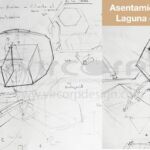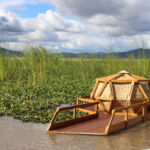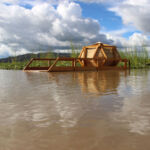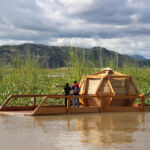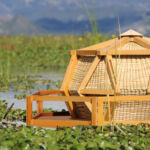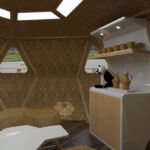Nomad Settlement Ecological - VIRCORP S.A.S
Project's Summary
The Nomad Settlement Ecological project, developed by VIRCORP S.A.S, offers a transformative experience centered around the stunning Fúquene Lagoon. This unique initiative seeks to highlight the ecological and cultural significance of one of the most vital aquatic ecosystems in the Cundiboyacense highlands. Through the integration of local communities in the conservation efforts, the project aims to not only protect the environment but also boost the local economy through sustainable ecotourism practices. By fostering an environment where tourism and conservation coexist, the project lays the groundwork for a sustainable future.

Central to the Nomad Settlement project is the establishment of artisanal floating settlements that are designed using traditional techniques and modern ecological principles. Crafted from junco, a natural fiber abundant in the lagoon, these structures provide a unique and immersive experience for tourists. Visitors will enjoy the beauty of nature while actively participating in the preservation of local culture and heritage. The project aims to bridge the gap between tourism and cultural preservation, ensuring that the rich traditions of the region are honored and maintained.

The design of the settlements is inspired by biomimicry, utilizing nature’s own structures to create sustainable and stable living spaces. The hexagonal geometry not only offers aesthetic appeal but also enhances structural integrity and modularity. This innovative approach allows for efficient use of materials and promotes ecological balance within the lagoon's environment. By prioritizing natural products in the construction process, the project minimizes its environmental footprint, setting a precedent for future ecotourism developments.

In addition to offering visitors a chance to connect with nature, the Nomad Settlement project also revitalizes ancient artisanal techniques that have been passed down through generations. By engaging local artisans in the construction and maintenance of these floating settlements, the project not only preserves these skills but also enhances the economic well-being of the community. The use of junco, often considered a weed, is transformed into a valuable resource, showcasing the potential for sustainable practices in tourism and architecture.

Overall, the Nomad Settlement Ecological project is a pioneering effort to harmonize tourism with ecological conservation and cultural preservation. By bringing together the beauty of the Fúquene Lagoon and the rich cultural heritage of the surrounding communities, VIRCORP S.A.S is creating an innovative model that promotes sustainability while offering unforgettable experiences for tourists. This approach not only benefits the local ecosystem but also elevates the cultural significance of the region, ensuring a brighter future for both the environment and its people.
Read also about the Office of Lee & Son Leather by ASWA in Bangkok, Thailand project
